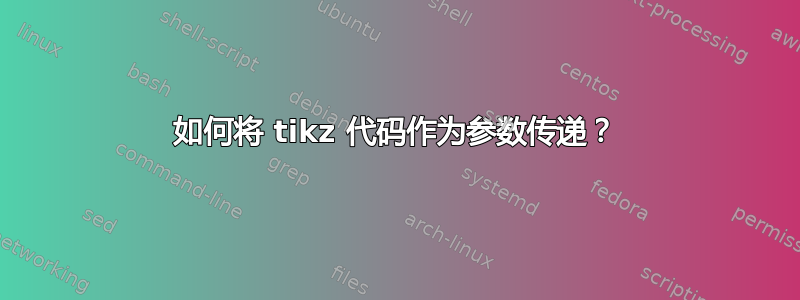
我想准备一个环境来显示一个显示器视图,并使用一些 tikz 代码作为可选参数来标记其上的某些内容。第一个“屏幕”显示带有硬编码节点的结果,但我需要像在第二个“屏幕”中一样将其作为参数传递,但它在编译期间会抛出错误。
如何解决?
代码
\documentclass{article}
\usepackage{geometry}
\usepackage{float}
\usepackage{adjustbox}
\usepackage{graphicx}
\usepackage{tikz}
\usetikzlibrary{arrows.meta}
\usetikzlibrary{fit}
\usepackage{blindtext}
\usepackage{wrapfig}
\usepackage[babel=true]{microtype}
\newcommand{\fontsmall}{\fontsize{5pt}{6pt}\selectfont}
\newcommand{\fontnormal}{\fontsize{10pt}{12pt}\selectfont}
\floatstyle{boxed}
\newfloat{myfloat}{tbp}{extdisplay}
\newcommand\displayenvargument{}
\newenvironment{display}[1][]{%
\renewcommand{\displayenvargument}{#1}
\setlength{\intextsep}{10pt}%
\SetTracking{encoding={*}}{150}%
\bfseries%
\fontnormal%
\wrapfloat{myfloat}{O}[0ex]{17\baselineskip}%
\begin{tikzpicture}[
numer/.style={draw, red, thick, circle, inner sep=0.2ex},
element/.style={draw, blue, thick, rectangle, rounded corners, inner sep=0},
strzala/.style={-stealth,red,thick},
linia/.style={red,thick},
]
\node[anchor=south west,inner sep=0] (image) at (0,0)
\bgroup
\adjustbox{scale={1.25}{1.00}}\bgroup
\begin{minipage}[][7.75\baselineskip][t]{12\baselineskip}%
\lsstyle%
}{%
\end{minipage}%
\egroup
\egroup;
\begin{scope}[x={(image.south east)},y={(image.north west)}]
% grid
\draw[help lines,ultra thin,xstep=.10,ystep=.10,lightgray] (0,0) grid (1,1);
\foreach \x in {1,...,9} { \node [red,anchor=north] at (\x/10,0) {\tiny 0.\x}; }
\foreach \y in {1,...,9} { \node [red,anchor=east] at (0,\y/10) {\tiny 0.\y}; }
% argument
\displayenvargument
% BEGIN OF ARGUMENT CONTENT
\node (text_num) at (0.2,0.3) [numer] {1};
\node (text) [element, fit={(0.4,0.6)(0.6,0.73)}] {};
\draw [strzala] (text_num) -- (text);
% END OF ARGUMENT CONTENT
\end{scope}
\end{tikzpicture}
\endwrapfloat%
\par%
}
\begin{document}
\begin{display}%
~\par
~\par
\begin{center}
text
\end{center}\par
~\par
~\par
~\par
~\par
~\par
\end{display}%
\blindtext
\begin{display}[%
% this doesn't work
% BEGIN OF ARGUMENT CONTENT
% \node (text_num) at (0.8,0.7) [numer] {1};
% \node (text) [element, fit={(0.4,0.22)(0.6,0.34)}] {};
% \draw [strzala] (text_num) -- (text);
% END OF ARGUMENT CONTENT
]
~\par
~\par
~\par
~\par
~\par
\begin{center}
text
\end{center}\par
~\par
~\par
\end{display}%
\blindtext
\end{document}
答案1
好的,我自己用\NewDocumentEnvironmentfromxparse创建环境解决了这个问题。
并添加星号版本以显示或不显示网格。
\documentclass{article}
\usepackage{geometry}
\usepackage{float}
\usepackage{adjustbox}
\usepackage{graphicx}
\usepackage{xparse}
\usepackage{tikz}
\usetikzlibrary{arrows.meta}
\usetikzlibrary{fit}
\usepackage{blindtext}
\usepackage{wrapfig}
\usepackage[babel=true]{microtype}
\newcommand{\fontsmall}{\fontsize{5pt}{6pt}\selectfont}
\newcommand{\fontnormal}{\fontsize{10pt}{12pt}\selectfont}
\floatstyle{boxed}
\newfloat{myfloat}{tbp}{extdisplay}
\NewDocumentEnvironment{display}{sO{}}{%
\setlength{\intextsep}{10pt}%
\SetTracking{encoding={*}}{150}%
\bfseries%
\fontnormal%
\wrapfloat{myfloat}{O}[0ex]{17\baselineskip}%
\begin{tikzpicture}[
numer/.style={draw, red, thick, circle, inner sep=0.2ex},
element/.style={draw, blue, thick, rectangle, rounded corners, inner sep=0},
strzala/.style={-stealth,red,thick},
linia/.style={red,thick},
]
\node[anchor=south west,inner sep=0] (image) at (0,0)
\bgroup
\adjustbox{scale={1.25}{1.00}}\bgroup
\begin{minipage}[][7.75\baselineskip][t]{12\baselineskip}%
\lsstyle%
}{%
\end{minipage}%
\egroup
\egroup;
\begin{scope}[x={(image.south east)},y={(image.north west)}]
% grid
\IfBooleanT {#1}{
\draw[help lines,ultra thin,xstep=.10,ystep=.10,lightgray] (0,0) grid (1,1);
\foreach \x in {1,...,9} { \node [red,anchor=north] at (\x/10,0) {\tiny 0.\x}; }
\foreach \y in {1,...,9} { \node [red,anchor=east] at (0,\y/10) {\tiny 0.\y}; }
}%
% argument
\noexpand{#2} % without \noexpand first line of argument does not appear
% BEGIN OF ARGUMENT CONTENT
\node (text_num) at (0.2,0.3) [numer] {1};
\node (text) [element, fit={(0.4,0.6)(0.6,0.73)}] {};
\draw [strzala] (text_num) -- (text);
% END OF ARGUMENT CONTENT
\end{scope}
\end{tikzpicture}
\endwrapfloat%
\par%
}
\ExplSyntaxOn
\cs_new:cpn {display*} {\display*}
\cs_new_eq:cN {enddisplay*} \enddisplay
\ExplSyntaxOff
\begin{document}
\begin{display*}
~\par
~\par
\begin{center}
text
\end{center}\par
~\par
~\par
~\par
~\par
~\par
\end{display*}
\blindtext
\begin{display*}[
\node (text_num) at (0.8,0.7) [numer] {2};
\node (text) [element, fit={(0.4,0.22)(0.6,0.34)}] {};
\draw [strzala] (text_num) -- (text);
]
~\par
~\par
~\par
~\par
~\par
\begin{center}
text
\end{center}\par
~\par
~\par
\end{display*}%
\blindtext
\begin{display}[
\node (text_num) at (0.8,0.7) [numer] {2};
\node (text) [element, fit={(0.4,0.22)(0.6,0.34)}] {};
\draw [strzala] (text_num) -- (text);
]
~\par
~\par
~\par
~\par
~\par
\begin{center}
text
\end{center}\par
~\par
~\par
\end{display}
\blindtext
\end{document}
附言:我不知道它为什么有效,但对我的目的来说有效。



